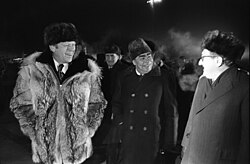Henry Kissinger
Henry Kissinger on NobelPrize.orgHenry Alfred Wolfgang Kissinger (born Heinz Alfred Wolfgang Kissinger; May 27, 1923 – November 29, 2023), pronounced /ˈkɪsɪndʒər/,[2] was a German-American political scientist, diplomat, and winner of the Nobel Peace Prize.[3] He served as both National Security Advisor and later as Secretary of State in the Nixon Administration and the Ford Administration.[3]
Henry Kissinger | |
|---|---|
 | |
| 56th United States Secretary of State | |
| In office September 22, 1973 – January 20, 1977 | |
| President | Richard Nixon Gerald Ford |
| Deputy | Kenneth Rush Robert Ingersoll Charles Robinson |
| Preceded by | William Rogers |
| Succeeded by | Cyrus Vance |
| United States National Security Advisor | |
| In office January 20, 1969 – November 3, 1975 | |
| President | Richard Nixon Gerald Ford |
| Preceded by | Walt Rostow |
| Succeeded by | Brent Scowcroft |
| 22nd Chancellor of The College of William & Mary | |
| In office February 10, 2001 – April 7, 2006 | |
| Preceded by | Margaret Thatcher |
| Succeeded by | Sandra Day O'Connor |
| Personal details | |
| Born | Heinz Alfred Kissinger May 27, 1923 Fürth, Bavaria, Germany[1] |
| Died | November 29, 2023 (aged 100) Kent, Connecticut, U.S. |
| Political party | Republican |
| Spouse(s) | Ann Fleischer
(m. 1949; div. 1964) |
| Alma mater | City University of New York, City College Harvard University |
| Signature | |
| Military service | |
| Allegiance | |
| Branch/service | United States Army seal United States Army |
| Rank | Sergeant |
| Unit | 970th Counter Intelligence Corps |
Early life
Kissinger was born in Germany in 1923. As a German Jew, it was not safe for him to stay in Germany after Adolf Hitler came to power, and he left for the United States in 1933. He fought for the US against the Nazis in World War Two.
Nixon administration
Kissinger was Richard Nixon's most trusted advisor on foreign affairs. He was in government during the Cold War and promoted what he called "realpolitik" in dealing with the Soviet Union and Communist China. He was a major force behind the 1973 ceasefire in the Vietnam War. He won a Nobel Peace Prize for the ceasefire, but the agreement fell apart in 1975. Under Kissinger, the US opened up relations to China, which is considered one of his biggest successes. He also supported détente, an easing of the rivalry with the Soviets.
Later years
In his later years, Kissinger — along with William Perry, Sam Nunn, and George Shultz — called upon governments to reduce nuclear weapons, and in three Wall Street Journal articles proposed a program of urgent steps to that end. The four have created the Nuclear Security Project to advance this cause.[4]
Kissinger died at the age of 100 on November 29, 2023, at his home in Kent, Connecticut.[5]
Legacy
His legacy is often debated by historians. Some people criticize him, even calling him a criminal, for his tactics during the Cold War, notably supporting a military junta in Chile and backing Pakistan during the Bangladesh War. Many people, however, consider Kissinger a great figure in modern American history who ended the Vietnam War, opened up China, and supported peace in the Cold War.
Henry Kissinger Media
- Henry Kissinger (1950 Harvard yearbook).jpg
Portrait of Kissinger as a Harvard senior in 1950
Kissinger being sworn in as Secretary of State by Chief Justice Warren Burger, September 22, 1973. Kissinger's mother, Paula, holds the Bible as President Nixon looks on.
Kissinger, shown here with Zhou Enlai and Mao Zedong, negotiated rapprochement with China.
Kissinger and President Richard Nixon discussing the Vietnam situation in Camp David, 1972 (with Alexander Haig)
President Ford, General Secretary Leonid Brezhnev, and Kissinger speaking informally at the Vladivostok Summit in 1974
- Henry Kissinger.png
Kissinger in the West Wing as National Security Adviser in April 1975.
- President Nixon, Henry Kissinger and Israeli Prime Minister Golda Meir, meeting in the Oval Office 1973.gif
Kissinger sits in the Oval Office with President Nixon and Israeli Prime Minister Golda Meir, 1973.
- Henry Kissinger visit to Israel (997009326814505171).jpg
Kissinger during a 1961 visit to Israel
On October 31, 1973, Egyptian Foreign Minister Ismail Fahmi (left) meets with Richard Nixon (middle) and Henry Kissinger (right), about a week after the end of fighting in the Yom Kippur War.
- King Faisal bin Abdulaziz 5.jpg
Kissinger and King Faisal of Saudi Arabia in Riyadh on March 19, 1975. In the far background behind Faisal is his half-brother, the future King Fahd.
References
- ↑ Isaacson, pp 20.
- ↑ "Definition of KISSINGER". www.merriam-webster.com.
- ↑ 3.0 3.1 "Ex-US Secretary of State Kissinger hospitalized". Retrieved 2010-03-13.[dead link]
- ↑ Maclin, Beth (2008-10-20) "A Nuclear weapon-free world is possible, Nunn says"[dead link], Belfer Center, Harvard University. Retrieved on 2008-10-21.
- ↑ Pengelly, Martin (2023-11-30). "Henry Kissinger, secretary of state to Richard Nixon, dies at 100" (in en-GB). The Guardian. . https://www.theguardian.com/us-news/2023/nov/29/henry-kissinger-dies-secretary-of-state-richard-nixon. Retrieved 2023-11-30.
Other websites
| Wikimedia Commons has media related to Lua error in Module:Commons_link at line 62: attempt to index field 'wikibase' (a nil value).. |
- Annotated Bibliography for Henry Kissinger from the Alsos Digital Library for Nuclear Issues Archived 2016-04-27 at the Wayback Machine
- Official Website of Henry A. Kissinger
- Henry Kissinger on IMDb
- "Charlie Rose" Archived 2012-02-14 at the Wayback Machine A conversation with Henry Kissinger, December 16, 2008
- Henry Kissinger speaks at the Asia Society, NYC, February 2007 Archived 2009-02-24 at the Wayback Machine
- Kissinger's political donations Archived 2012-05-12 at the Wayback Machine
- NPR: Kissinger Speech at National Press Club Archived 2018-12-15 at the Wayback Machine. Towards the end [55:55], he responds to Hitchens.


